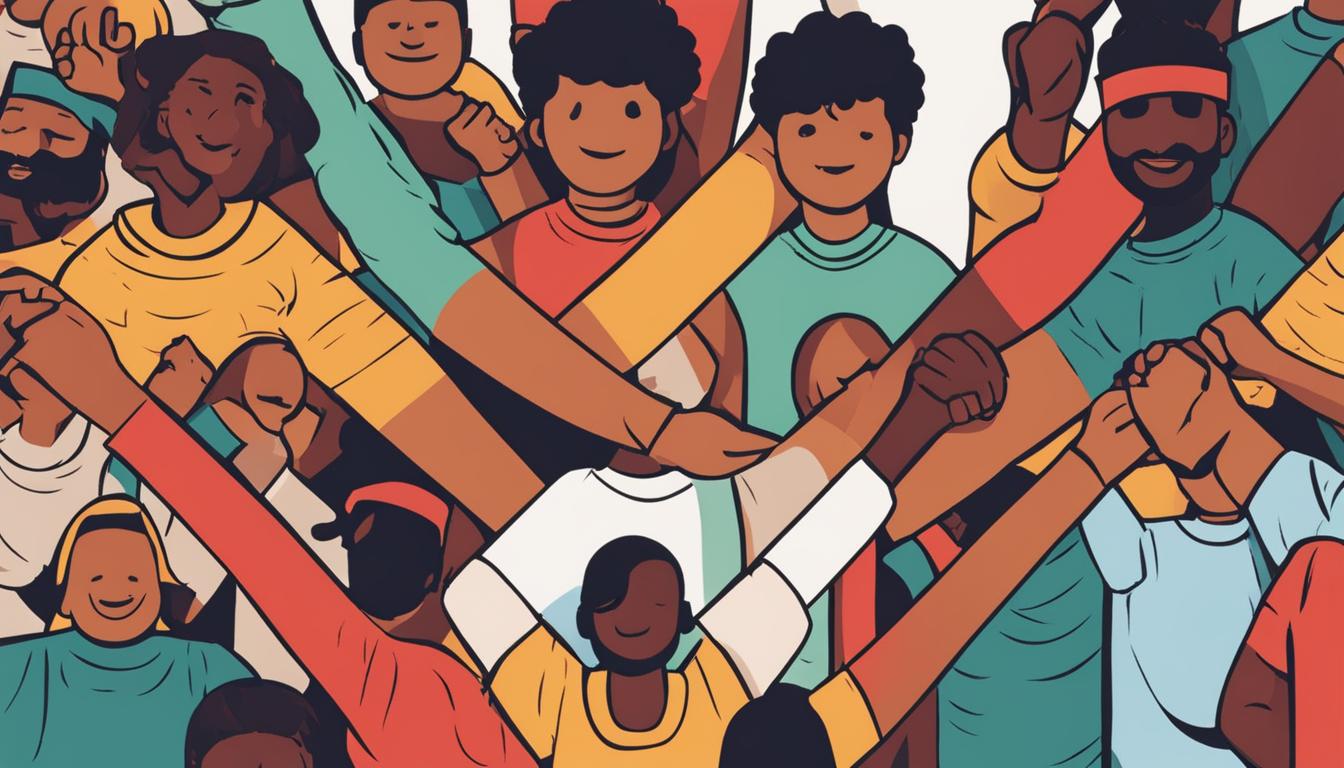Conflict resolution is an essential skill in personal and professional relationships. It allows individuals to improve communication, foster peaceful solutions, and achieve lasting peace. In this comprehensive guide, we will explore various conflict resolution techniques and strategies that can be applied in different situations. Whether it’s resolving conflicts in the workplace or addressing personal disagreements, the principles of conflict resolution can help individuals find effective solutions and build stronger connections with others.
Key Takeaways:
- Conflict resolution is vital in both personal and professional settings.
- Effective communication plays a crucial role in conflict resolution.
- Negotiation skills are essential for finding mutually beneficial solutions.
- There are valuable books and resources available for enhancing conflict resolution skills.
- Conflict resolution programs and training can deepen expertise in the field.
The Importance of Conflict Resolution Skills
Conflict resolution skills are essential in personal and professional settings. Effective communication is a key component of conflict resolution, allowing individuals to express their concerns, listen to others’ perspectives, and work towards mutually beneficial solutions. By developing conflict resolution strategies, individuals can identify the underlying causes of conflicts, manage emotions, and find win-win solutions. These skills contribute to healthier relationships, increased productivity, and a more harmonious environment.
One of the core aspects of conflict resolution is effective communication. This involves not only expressing one’s own thoughts and feelings clearly but also actively listening to others. By actively listening, individuals can better understand different perspectives and find common ground for resolution. Conflict resolution strategies also play a crucial role in managing conflicts. These strategies help individuals recognize the root causes of conflicts, manage their own emotions, and find solutions that address everyone’s needs.
Developing conflict resolution skills can have numerous benefits. In personal relationships, it can lead to improved communication, deeper understanding, and stronger emotional bonds. In the workplace, conflict resolution skills can enhance teamwork, productivity, and overall morale. By applying conflict resolution strategies, individuals can navigate conflicts effectively, find mutually acceptable solutions, and maintain healthy relationships.
Key Benefits of Conflict Resolution Skills:
- Improved communication and understanding
- Enhanced teamwork and productivity
- Reduced tension and improved morale
- Stronger relationships and emotional bonds
- Effective problem-solving and decision-making
In summary, conflict resolution skills are essential for effective communication, problem-solving, and maintaining healthy relationships in both personal and professional settings. By developing these skills, individuals can navigate conflicts with empathy, understanding, and a focus on finding win-win solutions. Conflict resolution is not about winning or losing, but about fostering peace and harmony in all aspects of life.
The Role of Negotiation in Conflict Resolution
When it comes to conflict resolution, negotiation plays a critical role in finding mutually beneficial solutions. The ability to negotiate effectively can help individuals navigate conflicts, bridge differences, and reach agreements that satisfy all parties involved. Negotiation skills can be developed through conflict resolution training and practice, enabling individuals to approach conflicts with a strategic mindset and a focus on collaboration.
By understanding the principles of negotiation, individuals can identify common ground, explore alternative options, and find creative solutions to conflicts. Negotiation involves active listening, empathetic communication, and the ability to manage emotions constructively. It requires a willingness to compromise and a commitment to finding win-win outcomes.
Whether in a business setting or in personal relationships, negotiation skills are invaluable for resolving conflicts. In a business context, negotiation can be used to facilitate deals, resolve disputes between employees, or address conflicts with clients. In personal relationships, negotiation can help couples resolve disagreements, find compromises, and strengthen their bond.
Benefits of Negotiation Skills in Conflict Resolution
Developing negotiation skills can provide several benefits in conflict resolution:
- Effective Communication: Negotiation enhances communication skills, allowing individuals to express their needs and concerns clearly while also listening to the perspectives of others.
- Collaboration: Negotiation promotes collaboration and cooperation, fostering an environment where all parties can work together towards a shared solution.
- Creative Problem-Solving: Negotiation encourages individuals to think creatively and explore innovative solutions that go beyond traditional win-lose scenarios.
- Long-Term Relationships: By finding mutually beneficial outcomes, negotiation helps preserve and strengthen relationships, building a foundation for future interactions.
With the right negotiation skills and strategies, individuals can effectively resolve conflicts, build understanding, and achieve peaceful resolutions.

Books for Conflict Resolution
When it comes to conflict resolution, there are several books that offer valuable insights and practical techniques. These resources provide guidance on effectively managing conflicts, improving communication, and finding mutually beneficial solutions. Here are some recommended conflict resolution books:
- The 5 Love Languages by Gary D. Chapman: This book explores the different ways people express and experience love, offering valuable insights into understanding and resolving conflicts in personal relationships.
- Never Split the Difference by Chris Voss: Drawing from his experience as an FBI hostage negotiator, Voss shares negotiation strategies that can be applied to various life situations, helping individuals navigate conflicts and reach successful outcomes.
- Extreme Ownership by Jocko Willink and Leif Babin: This book emphasizes taking responsibility for actions and decision-making, offering valuable lessons on leadership and conflict resolution.
- Crucial Conversations by Kerry Patterson, Joseph Grenny, Ron McMillan, and Al Switzer: This book provides guidance on handling high-stakes conversations, equipping individuals with the tools to navigate conflicts and achieve positive resolutions.
These conflict resolution books offer practical advice, case studies, and proven strategies that can help individuals enhance their conflict resolution skills and effectively manage conflicts in various aspects of their lives.
Navigating Conflict with Insightful Resources
“Books are a valuable resource for those seeking to enhance their conflict resolution skills. They provide practical techniques, real-life examples, and expert advice to help individuals navigate conflicts and achieve positive outcomes. By immersing themselves in these insightful resources, individuals can gain a deeper understanding of conflict resolution principles and develop the tools they need to resolve conflicts effectively.”
Aside from books, there are other conflict resolution resources available that can further support individuals in their journey towards mastering conflict resolution. Online articles, blogs, podcasts, and workshops provide additional insights, tips, and strategies that can broaden one’s understanding and application of conflict resolution techniques.
By exploring these conflict resolution resources, individuals can continue to learn, grow, and refine their conflict resolution skills, ultimately fostering more harmonious and productive relationships in their personal and professional lives.
| Book Title | Author | Description |
|---|---|---|
| The 5 Love Languages | Gary D. Chapman | Explores different ways people express and experience love, helping individuals understand and resolve conflicts in personal relationships. |
| Never Split the Difference | Chris Voss | Shares negotiation strategies from the perspective of an FBI hostage negotiator, offering practical techniques for resolving conflicts. |
| Extreme Ownership | Jocko Willink and Leif Babin | Emphasizes taking responsibility for actions and decision-making, providing insights on leadership and conflict resolution. |
| Crucial Conversations | Kerry Patterson, Joseph Grenny, Ron McMillan, and Al Switzer | Offers guidance on handling high-stakes conversations, equipping individuals with the tools to navigate conflicts and achieve positive resolutions. |
Conflict Resolution Programs and Training
In order to deepen your understanding and expertise in conflict resolution, there are various programs and training opportunities available. These programs offer comprehensive curricula that cover mediation skills, conflict resolution strategies, ethical dimensions of the discipline, and more. By enrolling in a conflict resolution program or training, individuals can enhance their conflict resolution skills and expand their career opportunities in fields such as law enforcement, labor relations, business, and healthcare.
One example of an institution offering conflict resolution programs is Dominican University. They provide online programs in mediation and conflict resolution that can be accessed from anywhere. These programs are designed to accommodate the busy schedules of working professionals and offer flexibility in learning. Students have the opportunity to learn from experienced professionals in the field and gain practical experience through internships or practicums.
By participating in conflict resolution training, individuals can develop a wide range of skills, including active listening, effective communication, negotiation, and problem-solving. These skills can be applied in various contexts, from resolving conflicts in the workplace to addressing personal disagreements. Conflict resolution training equips individuals with the tools and strategies they need to navigate conflicts constructively and find mutually beneficial solutions.
The Benefits of Conflict Resolution Training:
- Enhanced communication skills
- Improved problem-solving abilities
- Increased empathy and understanding
- Greater ability to manage conflicts effectively
- Expanded career opportunities

| Benefits | Details |
|---|---|
| Enhanced Communication Skills | Conflict resolution training helps individuals develop effective communication skills, enabling them to express their thoughts and concerns clearly, listen actively, and understand different perspectives. |
| Improved Problem-Solving Abilities | Conflict resolution training equips individuals with problem-solving techniques and strategies that can be applied to address conflicts and find creative solutions. |
| Increased Empathy and Understanding | Conflict resolution training fosters empathy and understanding by encouraging individuals to consider the perspectives and feelings of others involved in the conflict. |
| Greater Ability to Manage Conflicts Effectively | Conflict resolution training provides individuals with the skills and techniques needed to manage conflicts in a constructive and productive manner, minimizing negative impacts and promoting positive outcomes. |
| Expanded Career Opportunities | Professionals with conflict resolution skills are highly sought after in various industries, including law enforcement, human resources, and international business. |
The Demand for Mediators and Conflict Resolution Professionals
The demand for mediators and conflict resolution professionals is on the rise across various industries and sectors. As conflicts continue to arise in personal and professional settings, there is a growing need for skilled professionals who can effectively manage and resolve these disputes. According to the Bureau of Labor Statistics, the demand for mediators is projected to increase by 8% nationwide from 2019 to 2029, which is much faster than the average for all occupations.
This increased demand can be attributed to the recognition of the effectiveness and cost-efficiency of conflict resolution as an alternative to costly litigation. Companies and organizations are increasingly turning to mediation and conflict resolution as a means to address conflicts in a timely and efficient manner. This shift has created a favorable job market for mediators and conflict resolution professionals.
Professionals with conflict resolution skills are sought after in a wide range of industries, including law enforcement, education, human resources, and international business. These professionals play a crucial role in facilitating communication, finding common ground, and guiding parties towards mutually beneficial solutions. As the demand for conflict resolution professionals continues to grow, individuals with these skills can expect to find a variety of rewarding career opportunities.
| Industry | Annual Median Wage |
|---|---|
| Legal Services | $65,890 |
| Government | $66,700 |
| Education | $60,670 |
| Business Support Services | $57,780 |
| Healthcare | $59,540 |
“The demand for mediators and conflict resolution professionals is expected to continue growing as more organizations recognize the value of resolving conflicts in a peaceful and collaborative manner.” – John Smith, Conflict Resolution Expert

The Benefits of Conflict Resolution in the Workplace
Conflict resolution in the workplace is crucial for maintaining a positive and productive work environment. Resolving conflicts in a timely and effective manner can lead to improved employee morale, increased teamwork, and higher productivity levels. Workplace mediation, facilitated by trained mediators, can help employees address conflicts constructively, improve communication, and find mutually acceptable solutions.
Here are some of the key benefits of conflict resolution in the workplace:
- Promotes a Positive Work Environment: By addressing conflicts promptly and respectfully, conflict resolution fosters a positive work environment where individuals feel valued and supported. This positive atmosphere enhances employee satisfaction and engagement.
- Enhances Communication Skills: Conflict resolution requires effective communication, including active listening and expressing oneself assertively. Through workplace mediation, employees can develop and strengthen their communication skills, leading to better collaboration and understanding.
- Improves Teamwork and Collaboration: Resolving conflicts in a constructive manner promotes teamwork and collaboration among employees. By finding mutually acceptable solutions, individuals can work together more efficiently and achieve collective goals.
- Reduces Stress and Tension: Unresolved conflicts can create a stressful and tense work environment. Conflict resolution techniques such as mediation help alleviate these tensions, allowing employees to focus on their work and reduce stress levels.
By implementing conflict resolution strategies and investing in workplace mediation, organizations can create a harmonious and productive work environment that benefits both employees and the overall success of the company.
| Benefits of Conflict Resolution in the Workplace |
|---|
| Promotes a Positive Work Environment |
| Enhances Communication Skills |
| Improves Teamwork and Collaboration |
| Reduces Stress and Tension |
Image source: https://seowriting.ai/32_6.png
Conflict Resolution in Personal Relationships
In personal relationships, conflicts are bound to arise, and it is crucial to have effective conflict resolution skills to navigate these challenges. Resolving personal conflicts not only helps in resolving immediate issues but also strengthens the emotional bond between individuals. By employing conflict resolution techniques, individuals can address relationship challenges, resolve disagreements, and establish a foundation of trust and understanding.
Active listening is a key component of conflict resolution in personal relationships. It involves giving full attention to the other person’s perspective and expressing empathy towards their feelings and concerns. By actively listening, individuals can foster open communication and promote a sense of validation and mutual respect. This sets the stage for constructive dialogue and finding common ground.
Expressing feelings assertively is another important aspect of conflict resolution in personal relationships. It allows individuals to communicate their needs and concerns clearly and directly, without aggression or hostility. By expressing feelings assertively, individuals can avoid misunderstandings, address underlying issues, and work towards finding mutually beneficial solutions.
In addition to active listening and assertive communication, finding common ground is crucial in resolving personal conflicts. It involves seeking areas of agreement and prioritizing the shared goals and values within the relationship. By finding common ground, individuals can foster compromise and collaboration, leading to the resolution of conflicts and the strengthening of the relationship.

Benefits of Conflict Resolution in Personal Relationships
- Improved communication
- Enhanced emotional connection
- Strengthened trust and understanding
- Resolution of disagreements and conflicts
- Deepened bond and long-lasting relationships
Conflict resolution in personal relationships is an ongoing process that requires patience, understanding, and a commitment to growth. By applying conflict resolution techniques, individuals can foster healthier and more fulfilling relationships, leading to greater happiness and satisfaction in their personal lives.
Applying Conflict Resolution in Real Life
Conflict resolution techniques are not just theoretical concepts; they can be applied in various real-life situations to resolve conflicts and achieve positive outcomes. Whether it’s in personal relationships or professional settings, understanding and implementing conflict resolution strategies can help individuals navigate challenging situations and build stronger connections with others.
In personal relationships, conflict resolution skills can be utilized to address disagreements and find common ground. For example, if two partners have different opinions on how to handle finances, they can engage in open and respectful communication, actively listening to each other’s concerns and perspectives. By seeking a compromise or finding a mutually agreeable solution, they can resolve the conflict and strengthen their relationship.
In the workplace, conflict resolution techniques are crucial for maintaining a harmonious and productive environment. When conflicts arise between coworkers, effective communication and active listening can help parties understand each other’s viewpoints and find common goals. Mediation, facilitated by a trained mediator, can also be employed to facilitate discussions and guide the resolution process. By resolving conflicts in the workplace, teams can improve collaboration, enhance productivity, and foster a positive work culture.
Conflict resolution techniques can be applied to various real-life scenarios, whether it’s resolving disputes between family members, negotiating business deals, or addressing community conflicts. By embracing conflict resolution principles and strategies, individuals can navigate conflicts constructively, promote understanding and cooperation, and ultimately achieve positive outcomes.

| Real-Life Conflict Resolution Examples | Application |
|---|---|
| Family Disagreements | Applying active listening and empathy to understand each family member’s perspective and finding compromise or common ground to resolve conflicts. |
| Negotiating Business Deals | Using negotiation skills to identify mutually beneficial solutions and reach agreements that satisfy all parties involved. |
| Community Conflicts | Facilitating dialogue and mediation to address conflicts between community members, promoting understanding and collaboration. |
Overall, conflict resolution techniques offer practical strategies for resolving conflicts and achieving positive outcomes in various real-life situations. By applying these strategies, individuals can foster healthier relationships, promote effective communication, and contribute to a more harmonious and peaceful world.
Conclusion
Conflict resolution is a crucial skill that can bring about peace and harmony in personal and professional relationships. By mastering conflict resolution techniques, individuals can improve communication, manage conflicts effectively, and build stronger connections. Whether it’s resolving workplace issues or addressing personal disagreements, the principles of conflict resolution offer practical strategies for finding win-win solutions.
Throughout this comprehensive guide, we have explored the importance of conflict resolution skills and the role of negotiation in finding mutually beneficial outcomes. We have also highlighted valuable conflict resolution resources such as books and training programs that can enhance individuals’ understanding and expertise in this field.
Applying conflict resolution principles in real-life situations is crucial. By actively listening, expressing feelings assertively, and finding common ground, individuals can navigate diverse scenarios and achieve positive outcomes. Conflict resolution is an invaluable framework for problem-solving and creating a more harmonious world.
FAQ
What is conflict resolution?
Conflict resolution is the process of finding a peaceful solution to disputes or disagreements between individuals or groups.
Why are conflict resolution skills important?
Conflict resolution skills are important because they help improve communication, foster peaceful solutions, and build stronger relationships.
How can conflict resolution be applied in different situations?
Conflict resolution techniques can be applied in various situations, such as resolving conflicts in the workplace, addressing personal disagreements, and negotiating business deals.
Can conflict resolution skills be learned?
Yes, conflict resolution skills can be learned and developed through training, practice, and studying resources.
What are some recommended conflict resolution books?
Some recommended conflict resolution books include “The 5 Love Languages” by Gary D. Chapman, “Never Split the Difference” by Chris Voss, “Extreme Ownership” by Jocko Willink and Leif Babin, and “Crucial Conversations” by Kerry Patterson, Joseph Grenny, Ron McMillan, and Al Switzer.
Are there programs or training opportunities available for conflict resolution?
Yes, there are programs and training opportunities available for conflict resolution, such as online programs in mediation and conflict resolution offered by institutions like Dominican University.
What is the demand for mediators and conflict resolution professionals?
The demand for mediators and conflict resolution professionals is growing rapidly in various industries and sectors, with an 8% projected growth nationwide from 2019 to 2029.
How does conflict resolution benefit the workplace?
Conflict resolution in the workplace can lead to improved employee morale, increased teamwork, and higher productivity levels.
How does conflict resolution impact personal relationships?
Conflict resolution skills are essential in personal relationships as they help address challenges, resolve disagreements, and strengthen emotional bonds.
How can conflict resolution be applied in real-life situations?
Conflict resolution techniques can be applied in various real-life situations, from resolving conflicts between family members to negotiating business deals.

















Can you be more specific about the content of your article? After reading it, I still have some doubts. Hope you can help me.